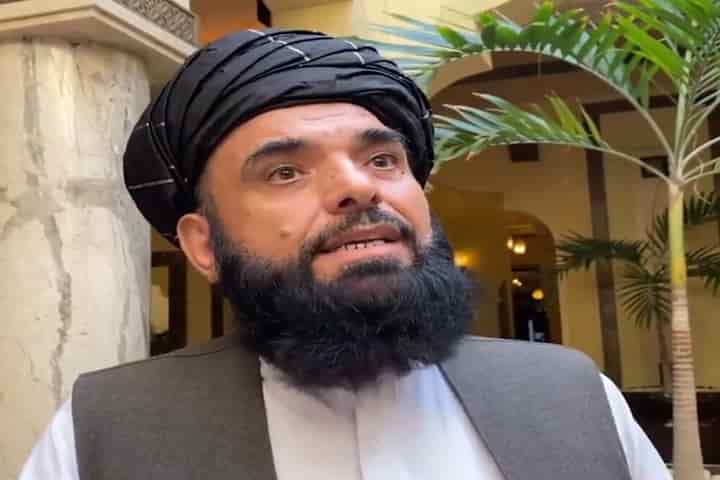

Suhail Shaheen, the Taliban spokesman in Doha has said that no foreign forces, including military contractors, should remain in Kabul after the withdrawal was completed (Pic: Courtesy historica.fandom.com)
The way intra-Afghan peace talks are proceeding, it would have been amusing but for the unending bloodshed. Even as the parties—the Taliban, the Afghan government and the US—take a slow walk towards the talks, prodded by none other than the US, the mayhem is absolutely tragic.
The path to the talks has been marred by intensified fighting between the Taliban and government forces. The two sides also accuse each other of sabotaging the peace process—poisoning the pre-talks atmosphere. The run-up to the talks is anything but friendly.
A statement by the Afghan Interior Ministry on Thursday said that Taliban-led violent incidents had claimed the lives of 121 civilians and wounded 336 others over the past two weeks. Senior government official Wahid Omar is reported to have told media that the Taliban has "no political and cultural assets, except imposing violence" for the talks.
The Taliban remains obtuse, saying that it does not recognize the Afghan government, Taliban spokesman Suhail Shaheen told an Iranian newspaper last week that the group doesn't consider the government in Kabul as legitimate.
The Taliban said: "The Islamic Emirate does not recognize the Kabul administration as a government but views it as Western imported structure working for the continuation of American occupation. Shaheen said that the Taliban is the winner of the war and will attend the intra-Afghan talks only to bring an Islamic government in Afghanistan.
Despite the on-ground violence in war-torn Afghanistan and verbal spats between the two main groups, the intra-Afghan talks may still happen this week.
The Afghan government has made the necessary overtures by releasing nearly 5,000 Taliban prisoners, except the dangerous ones, to create a cordial atmosphere. From the Afghan side, the talks are being led by President Ashraf Ghani, along with former president Hamid Karzai and Ghani’s arch opponent Abdullah Abdullah, Chairman of the High Council for National Reconciliation, which is a major achievement in itself.
The US continues to push the recalcitrant sides for talks. Currently, it is high on success as Israel and the UAE smoke the peace pipe, a rare achievement that Trump can flaunt before his electorate.
Trump is keen that the US withdraws from the Afghan quagmire. The country had met its objectives way back in 2011 when it bumped off Osama bin Laden who was in protection of the Pakistani Army. However, US forces remained in Afghanistan with Nato troops to provide support to the fledgling Afghan democracy. Now Trump feels it is time to withdraw Americans from a conflict that essentially involves Afghans.
A February 29, 2020, deal between the United States and the Taliban in Doha, Qatar, paved the way for intra-Afghan talks though these talks kept the Afghan government out. Under the US-Taliban Doha agreement, the US was to withdraw its troops in phases; talks between the Taliban and the Afghan government were to begin on March 20; the Taliban was to cease all attacks on Afghan forces and the Afghan government was to release 5,000 Taliban prisoners in exchange for 1,000 Afghan security personnel kidnapped by the Taliban.
A large number of these conditions have been met, though the deadline has been breached many times, and by many months. The process has been long and fraught with violations all through. The US has withdrawn its troops, marking a victory for Trump; the Afghan government has released most Taliban prisoners; the Taliban too has released most Afghan security personnel but attacks by the Taliban on civilian and military targets have not reduced.
The Taliban continues to obfuscate. It abstains from speaking with the Afghan government but continues to speak with American officials. It is not ready to share power with other Afghans and is not keen on the rights of women and minorities. It has not as yet condemned al-Qaeda and terrorism. The Taliban has said that it is looking forward to forming the government and running the country but not in a democratic manner.
Currently, the two sides have entered a stalemate over the release of prisoners and this threatens talks.
Quoting Afghan government sources, Tolo News reported that the Taliban has not released more than 20 Afghan commandos. On the other hand, the Taliban has said that it will not release them till 400 of their colleagues are not released. It also threatens to not attend the intra-Afghan talks. Ghani says the last-remaining Taliban prisoners are hardened criminals who the US, Australia and France do not want released.
Faced with a Taliban, which feels that it has snatched victory from the US, the democratic Afghan government too has hardened its stand. Ghani, who has not been happy with the US government’s attitude, has often said that the US might be in a hurry to leave the country, but his government will not let its people down. He has said that the people want peace and his government will wait for it even if the Taliban is not serious about talks.
The intra-Afghan talks, now in their last lap, will spring surprises. The US is, nonetheless, busy chasing various Afghans through Special Representative for Afghanistan Reconciliation, Zalmay Khalilzad, aided by US Secretary of State Mike Pompeo, who is prodding the Afghans to move forward on peace talks..
Union Minister Hardeep Puri on Tuesday highlighted Central Government's series of sweeping policy reforms under…
The World Food Programme (WFP) has once again raised alarm over the worsening humanitarian crisis…
The Tibetan and Korean Buddhist communities in Busan came together to celebrate the 90th birthday…
Taiwan plans to ask its diplomatic partners and friendly nations to bring up China's unilateral…
Google has rolled out AI Mode feature for all users in India, which will make…
71-year-old physician and veteran lawmaker Jennifer Geerlings-Simons has been elected as Suriname's first female president,…